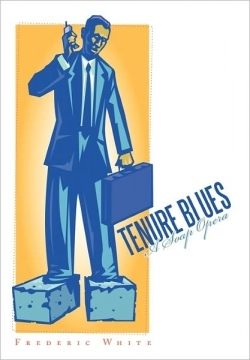Tenure Blues
A Soap Opera
There’s much good fun to be anticipated when an author offers a sardonic take on an environment he knows well. A reader may wonder, “What’s in store? Satire, irony, dirty secrets…or a nice, hot mix?”
White is an attorney, a law professor, and a law school dean. Readers shouldn’t be surprised he knows the game and the players. Only a few pages into Tenure Blues, the author notes, “Law faculties are notorious for their bizarre collections of usually bright, often ego-centric and sometimes petty scholars.”
That’s the tinder littering the halls of an unnamed law school at a mid-western state university. The spark comes in the form of the opportunity for tenure, the brightly gleaming scholarly brass ring. Tenure—respect and prestige. And professional security. In White’s novel, there are three candidates, all of whom are more or less equally qualified, and all of whom have something they’d rather not share with the tenure committee. Or anyone else, for that matter.
Michelle “Shelley” Claire is well-liked by students, has been published in the right journals, but she has a husband no one knows about, which is the way she’d like to keep it since he’s a cad from head to heel.
Patrick Marquain started his legal career late, doesn’t have exactly the accomplishments he’d prefer, but nonetheless, he’s a good candidate for tenure—at least until the committee learns he long ago had a drunken one-night stand with the law school dean’s son.
Eva Longshore is the perfect candidate. She’s intelligent, respected, has checked off all the right boxes on her résumé, but she’s in the middle of a torrid affair with the president of the college’s board of trustees. It doesn’t help that the man won’t marry her because he can’t divorce his wife and thereby ruin his chance to run for governor. Or maybe it’s because she’s African American.
In the prologue readers learn Rick Werner, the law school dean’s son, has been killed in a hit-and-run accident, but it’s only as the narrative unfolds that it’s clear all three candidates for tenure had reason to want him out of the picture. That’s the mystery, and it’s a good one.
This wonderfully plotted book, however, lacked a good proof-reader. Pronouns sometimes go astray: “Shelley didn’t waste all of their mental venom …” Stray words linger: “…as a reviewer or of one of her articles …” And redundancies slip by: “… Marquain’s fears did not subside but remained unabated.” One chapter, “Back Story,” badly needs restructuring. Granted, readers caught up in whodunit might gloss over these nits, but others, the more obsessive, will find them distracting.
White doesn’t write laugh-out-loud funny, his scenario is entirely believable, and his knowledge of the milieu and its denizens are unchallengeable. Tenure Blues possesses all the ribald hijinks that would make for an excellent film treatment. What’s better comedy fodder than ambition, money, power, and sex?
Reviewed by
Gary Presley
Disclosure: This article is not an endorsement, but a review. The publisher of this book provided free copies of the book and paid a small fee to have their book reviewed by a professional reviewer. Foreword Reviews and Clarion Reviews make no guarantee that the publisher will receive a positive review. Foreword Magazine, Inc. is disclosing this in accordance with the Federal Trade Commission’s 16 CFR, Part 255.

